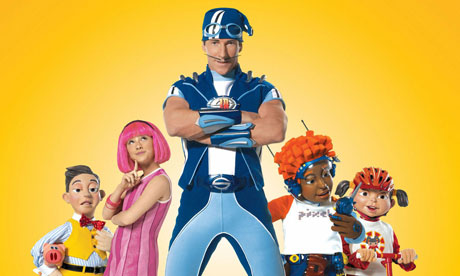
Ministers believe they may have hit upon a new weapon in the battle against obesity: a children's television series showing healthy lifestyles can be fun.
Andrew Lansley, the health secretary, believes that the stars of the BBC's LazyTown can help to turn young people on to physical activity and healthy eating.
He has held talks with Magnús Scheving, the show's creator and superfit action hero central character, about how its success can help the government's drive to tackle the couch potato culture.
LazyTown, aimed at four- to seven-year-olds and screened on the CBeebies channel, is widely admired. In it the athletic, acrobatic Sportacus, played by Scheving, tries to persuade the children of LazyTown to take part in physical activities outdoors rather than playing video games and to ignore junk food-eating Robbie Rotten, who wants them to be lazy.
The Conservatives first turned to Scheving when in opposition and he attended a party ideas-finding session on obesity hosted by David Cameron and Lansley. The Icelander won plaudits from UK health professionals by walking on to the stage of a National Obesity Forum conference on his hands.
"Hitching to the LazyTown chariot stands a very good chance of succeeding with pre-school and primary school kids," said Tam Fry, the forum's spokesman. "Sportacus is a cult with kids, and Magnús Scheving and his team are brilliant marketers. But will it inspire kids to continue their hero-worship into adolescence? I doubt it."
Lansley has sought inspiration from the show as part of a new phase of the government's Change4Life healthy living campaign and Responsibility Deal with the food and drink industries, which is being unveiled on Tuesday. A briefing document sent to industry leaders and health experts ahead of a pre-launch meeting tomorrow at the Department of Health says that one key objective is to "harness the popularity of LazyTown and the characters to encourage trial and sustained take-up of healthier behaviours".
On Tuesday food and alcohol industry bosses will publicly commit to helping promote healthy lifestyles as part of the Responsibility Deal in return for Lansley's previous promise not to use regulation or legislation to force them to play their part. But public health critics believe the health secretary is going too easy on industries whose products and activities can fuel unhealthy behaviour.
They say pledges big companies will sign up to do not go nearly far enough and point to repeated messages to food manufacturers that planned campaigns, such as The Great Big Summer Adventure, will offer the chance to market their products to children and mothers.
"The industry must be absolutely delighted," said Jackie Schneider of the Children's Food Campaign, an alliance of leading medical and educational groups. "Not only have they escaped any constraints on marketing and labelling but it looks like they will have a fantastic opportunity to market their products directly to children and families under the guise of a government-backed healthy living campaign.
This will allow food companies to appear responsible while distracting attention from the overweight elephant in the room: the real action the industry could take to help stop us being the fattest nation in Europe."
Department of health plans to offer children stickers as rewards for healthy behaviours, summer activity "passports" distributed via schools and money off vouchers would make no difference to Britain's worsening obesity crisis, she added: "It looks more like an effective form of marketing for the industry – with a veneer of social responsibility – than a public health strategy."
■ Drinks firms are to pledge to promote awareness of the number of units contained in their products in pubs, clubs and off-licences and abide by a new responsible marketing code. Critics say the moves are far too little to address rising levels of alcohol abuse.

